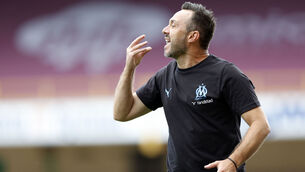Sat, 10 Jan, 2015 - 00:00
Paul Kelly
Denis said he “couldn’t believe it,”
One December day 50 years ago, Denis Law found himself with time on his hands.
Already a subscriber? Sign in
You have reached your article limit.
Subscribe to access all of the Irish Examiner.
Annual €130 €80
Best value
Monthly €12€6 / month
Introductory offers for new customers. Annual billed once for first year. Renews at €130. Monthly initial discount (first 3 months) billed monthly, then €12 a month. Ts&Cs apply.
CONNECT WITH US TODAY
Be the first to know the latest news and updates
CourtsSoccerPlace: EuropePlace: ManchesterPlace: ZurichPlace: ParisPlace: Old TraffordPlace: SpainPlace: WembleyPlace: EnglandPlace: GlasgowPlace: MerseysidePerson: LawPerson: Paul KellyPerson: Denis LawPerson: DenisPerson: Stanley MatthewsPerson: Di StefanoPerson: KopaPerson: SivoriPerson: Luis SuarezPerson: SuarezPerson: SpaniardPerson: Amancio AmaroPerson: EusebioPerson: Paul Van HimstPerson: Enzo BearzotPerson: Antonio CabriniPerson: BearzotPerson: Matt BusbyPerson: BusbyEvent: ChristmasEvent: Football League ChampionshipEvent: 1964 European CupEvent: World Club ChampionshipEvent: European Nations’ CupEvent: Ballon d’OrEvent: CupEvent: World CupEvent: Munich airOrganisation: Manchester UnitedOrganisation: ScotlandOrganisation: Real MadridOrganisation: UnitedOrganisation: France FootballOrganisation: Inter MilanOrganisation: BarcelonaOrganisation: TorinoOrganisation: AOrganisation: XIOrganisation: EnglandOrganisation: FAOrganisation: ItalyOrganisation: TurinOrganisation: Juventus















